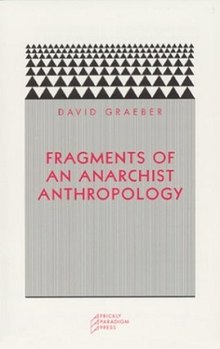|
Fragments of an Anarchist Anthropology Fragments of an Anarchist Anthropology is one of a series of pamphlets published by Prickly Paradigm Press in 2004.[1][2][3][4] With the essay, anthropologist David Graeber attempts to outline areas of research that intellectuals might explore in creating a cohesive body of anarchist social theory. Graeber posits that anthropology is "particularly well positioned" as an academic discipline that can look at the gamut of human societies and organizations, to study, analyze and catalog alternative social and economic structures around the world, and most importantly, present these alternatives to the world. Revolution through non-confrontationOne of the most striking suggestions in the pamphlet challenges the traditional anarchist notion of aggressive confrontation with the state. Graeber did postgraduate work with tribal cultures in Madagascar, including one with the Tsimihety in the northwest of the country. The Tsimihety, rejecting all governmental authority and organizing their society along very egalitarian lines, were able to continue their autonomy and culture for decades on end, up to the present, not by confronting the government, but by retreating. Graeber writes,
Aspects of an anarchist anthropologyIn particular, Graeber suggests several areas a hypothetical anarchist anthropology would need to tackle, and in the book elaborates on each point briefly:
Reasons for the nonexistence of anarchist anthropologyGraeber offers several possibilities why anthropologists are reluctant to come out and make normative judgments and proposals: "In many ways, anthropology seems a discipline terrified of its own potential. It is, for example, the only discipline in a position to make generalizations about humanity as a whole—since it is the only discipline that actually takes all of humanity into account, and is familiar with all the anomalous cases." (p. 96) Anthropologists, Graeber writes, may be also simply afraid of being dismissed as "utopian." Part of the problem, Graeber claims, is that academics on the radical left have gravitated toward the more "High Theory"-oriented Marxism rather than the more practice-oriented anarchism. Graeber further claims: "1. Marxism has tended to be a theoretical or analytical discourse about revolutionary strategy. 2. Anarchism has tended to be an ethical discourse about revolutionary practice" (p. 6). See also
References
Further reading
External links
|
Portal di Ensiklopedia Dunia